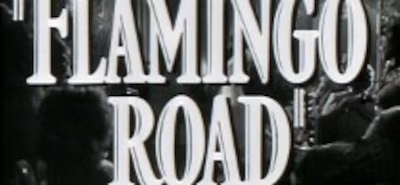Flamingo Road

Brief Synopsis
Cast & Crew
Michael Curtiz
Joan Crawford
Zachary Scott
Sydney Greenstreet
David Brian
Gladys George
Film Details
Technical Specs

Synopsis
Stranded in Boldon City when the carnival with which she is a dancer leaves town to avoid creditors, Lane Bellamy is befriended by deputy sheriff Fielding Carlisle, who has been sent to close down the carnival. Learning that the attractive Lane intends to get a job and settle in Boldon City, Field invites her to dinner and helps her obtain a waitress job and a place to stay. He is observed by his mentor, Sheriff Titus Semple, who plans to get Field elected to the state legislature. A woman such as Lane has no place in Titus' plans, and he encourages Field to marry socialite Annabelle Weldon, who lives on Flamingo Road, the town's wealthy section. Titus then has Lane fired from her job. When she tries to place an ad in the town newspaper, editor Doc Waterson explains that Titus will prevent her being hired anywhere in town. After Lane angrily confronts Titus and announces that she will stay in Boldon City if it kills her, Titus frames her for streetwalking, and she is sent to prison. There, another convict recommends that on her release, Lane ask Lute-Mae Sanders, the owner of a roadhouse, for a job. Lute-Mae likes Lane's spirit and, despite her misgivings, hires her. Titus again tries to have Lane fired, but Lute-Mae refuses to be bullied. One day, Lane meets political boss Dan Reynolds, who falls in love with her. He asks her to go with him when he leaves for New York and Washington, D.C. and, even though she is still in love with Field, Lane agrees. Meanwhile, with the help of Dan and Titus, Field, whose unhappy marriage has driven him to drink, is elected. When he encounters Dan and Lane in Washington, he learns that they have been married. After Dan and Lane return to Flamingo Road, Titus and Dan become adversaries when Dan refuses to run Field for governor. Titus then arranges to frame Dan for illegally using convict labor in his construction company. Field is so disturbed by Titus' tactics that he goes on a binge, and Titus abandons him. When Dan calls a meeting of his associates, Titus barges in and threatens all of them with jail if they do not agree to run him for governor. Only Dan refuses to give in to Titus' blackmail. Later, when Lane explains why Titus hates her so much, Dan mistakenly believes that she still loves Field and leaves town. Late one night, Field visits Lane, who tells him she no longer loves him. He then informs her that Titus framed Dan and, learning that she really loves her husband, kills himself in her house. Dan is indicted for peonage--illegally using prisoners to work without wages in business--and Waterson advises him to leave town. An angry Lane then follows Titus to Lute-Mae's and demands at gunpoint that he clear Dan's name. During the ensuing struggle, Titus is killed. Later, the death is ruled an accident, and Dan and Lane are reunited.

Director

Michael Curtiz
Cast
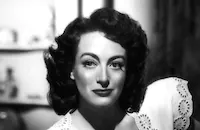
Joan Crawford

Zachary Scott

Sydney Greenstreet

David Brian
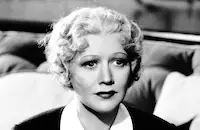
Gladys George

Virginia Huston
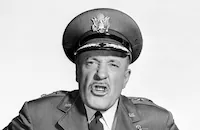
Fred Clark
Gertrude Michael

Alice White
Sam Mcdaniel
Dick Ryan
Pat Gleason
Louis J. Manley
Duke Johnson
Dolores Castle
Bridget Brown
Mike Carillo
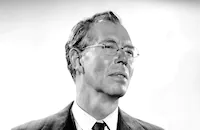
Walter Baldwin
Dick Elliott

James Flavin
Ken Britton
William Bailey
Tristram Coffin
Frank Cady

John Gallaudet
Morgan Farley
Merwyn Bogue

Dale Robertson
Gary Owen
Jack Cheatham
John Mcguire
Joel Allen

Iris Adrian
Bunty Cutler
Mary Bradley
Carol Brewster
Sunny Knight

Jerry Paris
Charles Conrad

Russ Conway
Raquel Flores
Bill Haade
Sammy Mckim
Jan Kayne
Tom Stevenson
Larry Blake

Pierre Watkin

Roy Gordon
Robert Strange
William Erwin
Leslie Kimmel

Tito Vuolo
Frank Scannell
Crew
George Amy
Folmar Blangsted
Henry Creamer
David Curtiz
Michael Curtiz
Murray Cutter
Ray Heindorf
James P. Johnson
Leo K. Kuter
Robert B. Lee
Ted Mccord
Edmund H. North
Sheila O'brien
Max Steiner
Norman Stuart
Travilla
Robert Vreeland
Jerry Wald
Perc Westmore
Robert Wilder
Howard Winterbottom

Photo Collections
Videos
Movie Clip



Trailer
Film Details
Technical Specs

Articles
Flamingo Road
In truth, Flamingo Road brought back the formula that had stood Crawford in good stead since the early days of talking films. In what is basically a rags-to-riches tale, she stars as a carnival dancer marooned in a small Southern town. It's love at first sight when she meets sheriff's deputy Zachary Scott, a young man with political ambitions, but hate at first sight when she meets his boss, corrupt sheriff Sydney Greenstreet. When Greenstreet keeps her from finding work in town, she signs on to sing at a juke joint just outside his jurisdiction. There, she attracts the attention of local political boss David Brian, whom she marries for prestige and power - and to take revenge on Greenstreet.
Mildred Pierce, in which she rose from impoverished housewife to business magnate, had put her back on top after being labeled box office poison. But her subsequent films, though quite well made, had broken the formula. Although each turned a small profit, Humoresque (1946), in which she gives arguably her best performance, and Possessed (1947), which brought her another Oscar® nomination, had been less successful than Mildred Pierce. Concerned that he had an aging star of limited appeal on his hands, studio head Jack L. Warner instructed his minions to keep an eye out for any sign of temperament he could use as an excuse to cancel her contract.
At the time, the failed stage play Flamingo Road was floating around the studio. Director Vincent Sherman (who had an affair with Crawford) turned it down, preferring to deal with Errol Flynn's ego on Adventures of Don Juan (1948). Meanwhile, director Michael Curtiz was looking for another project. To keep him from jumping ship and accepting an invitation to join fellow directors Frank Capra, George Stevens and William Wyler in the newly formed Liberty Pictures, Warner had offered him his own production unit. Curtiz's major accomplishment as a producer had been the discovery of Doris Day, whom he had signed to a personal contract and introduced to the screen in Romance on the High Seas (1948). With Flamingo Road, he had a chance to return to the feminist film noir he had helped create with Mildred Pierce and prove that Crawford was still a viable star.
Helping tremendously was the supporting cast. Zachary Scott, who had excelled as the oily society charmer who woos then betrays Crawford in Mildred Pierce, got a role closer to his Southern roots as the small-town sheriff plagued by insecurities. And Sydney Greenstreet, an accomplished Shakespearean actor on stage, brought his authority and impressive girth to the role of the evil sheriff. Many critics think it almost matched his work as Kasper Gutman in The Maltese Falcon (1941), one of the screen's greatest villainous performances.
With lots of moody, dark shadows, a tried-and-true rags-to-riches story and plenty of the Crawford pizzazz (she even showed her still attractive legs in the early carnival scenes), Flamingo Road was a box office success and guaranteed her a few more years at Warners. The film's soap opera elements made it a natural for television during the height of the prime-time soap opera. A new version of Flamingo Road debuted on NBC in 1980, first as a TV movie, then as a weekly series. Cristina Raines took over Crawford's role, with Mark Harmon as the deputy and Howard Duff as the sheriff. Crawford's original role was far overshadowed, however, when a supporting character not even in the original film generated more buzz, making Morgan Fairchild, as the tempestuous Southern belle who steals Harmon from Raines, the series' true star. It was the kind of performance Crawford herself would have given in her prime.
Director: Michael Curtiz
Producer: Michael Curtiz, Jerry Wald
Screenplay: Robert Wilder, Edmund H. North
Based on the play by Wilder and Sally Wilder
Cinematography: Ted D. McCord
Art Direction: Leo K. Kuter
Music: Max Steiner
Principal Cast: Joan Crawford (Lane Bellamy), Zachary Scott (Fielding Carlisle), Sydney Greenstreet (Sheriff Titus Semple), David Brian (Dan Reynolds), Gladys George (Lute Mae Sanders), Virginia Huston (Annabelle Weldon), Fred Clark (Doc Waterson), Gertrude Michael (Millie), Iris Adrian (Women's Prison Inmate), Dale Robertson (Tunis Simms).
BW-94m. Closed captioning.
by Frank Miller

Flamingo Road
Quotes
Trivia
Notes
A 27 August 1946 Hollywood Reporter news item reports that Pedro Armendáriz tested for a lead role in the film. According to a September 19, 1948 New York Times article, the film took two years to write and cast. Ann Sheridan, who was first cast in the lead role, rejected the part after deciding that the adaption was neither good nor faithful to the book. Robert Wilder then rewrote the script. The article adds that the novel and play were set in Florida, but the location was made anonymous in the film. In the novel, "Lute-Mae's" roadhouse was a house of prostitution. The film's opening credits read "Warner Bros. Pictures presents Joan Crawford in Flamingo Road by Robert Wilder." This film marked David Brian's first screen appearance. On May 26, 1950, Joan Crawford starred in A Screen Directors' Playhouse version of the story. A radio version of Flamingo Road starring Jane Wyman was broadcast by Lux Radio Theatre on October 2, 1950. The novel also provided the basis for a 1980 television movie, directed by Gus Trikonis and starring John Beck, Cristina Raines and Howard Duff, and for a follow-up 1981-82 NBC series of the same name.



